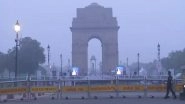Srinagar, Jun 18 (PTI) An encounter broke out between security forces and militants in Pulwama district of Jammu and Kashmir on Thursday, police said.
A cordon-and-search operation was launched in the morning by the forces at Meej in the Pampori area of south Kashmir's Pulwama after receiving specific information about the presence of militants, a police official said.
He said the operation turned into an encounter after the militants fired upon a search party of the forces.
A gunfight is underway and further details are awaited, the official said. PTI MIJ IJT 06180623 NNNNa favorite for Olympic gold in the 100 meters ahead of the Tokyo Games. Those games have been postponed to next year because of the coronavirus pandemic.
Coleman wrote on Twitter that drug testers were unable to find him Dec. 9 while he was shopping at a nearby mall for Christmas presents. That was his third infraction in a 12-month period.
Coleman asked why he didn't receive a phone call when the testers were unable to find him, saying he had received calls “every other time” he was tested.
“I think the attempt on December 9th was a purposeful attempt to get me to miss a test,” he wrote.
The AIU said a phone call wasn't a requirement and that it usually asks employees not to call athletes because that could undermine the testing program.
“Any advanced notice of testing, in the form of a phone call or otherwise, provides an opportunity for athletes to engage in tampering or evasion or other improper conduct which can limit the efficacy of testing,” the AIU said in an e-mailed statement.
The AIU added that under World Anti-Doping Agency rules “proof that a telephone call was made is not a requisite element of a missed test and the lack of any telephone call does not give the athlete a defense to the assertion of a missed test.”
Some of Coleman's earlier missed tests were not with the AIU but with the U.S. Anti-Doping Agency, whose own handbook for athletes says phone calls are usually reserved only for the last five minutes of a time slot and “to confirm the unavailability of the athlete, not to locate an athlete for testing.”
Athletes are required to list their whereabouts for an hour each day when they must be available to be tested. A violation means an athlete either did not fill out forms telling authorities where they could be found, or that they weren't where they said they would be when testers arrived.
Coleman said in his post he has been appealing the latest missed test for six months with the AIU, which runs the anti-doping program for World Athletics. He explained there was no record of anyone coming to his home and that if he had been called he was only five minutes away.
It's the second time Coleman has faced a potential ban for a whereabouts violation. Coleman won the 100 meters at the world championships in Doha, Qatar, last September after the U.S. Anti-Doping Agency dropped his case for missed tests because of a technicality.
“I have never and will never use performance enhancing supplements or drugs,” Coleman wrote Tuesday. “I am willing to take a drug test EVERY single day for the rest of my career for all I care to prove my innocence.” Coleman is the latest in a string of big-name athletes hit with whereabouts charges in 2020.
The AIU filed a similar charge this month against women's 400-meter world champion Salwa Eid Naser of Bahrain. She was already under investigation when she won gold in Doha last year in the fastest time since 1985.
Former U.S. national 200 champion Deajah Stevens was suspended in May. (AP)
(The above story is verified and authored by Press Trust of India (PTI) staff. PTI, India’s premier news agency, employs more than 400 journalists and 500 stringers to cover almost every district and small town in India.. The views appearing in the above post do not reflect the opinions of LatestLY)












 Quickly
Quickly


